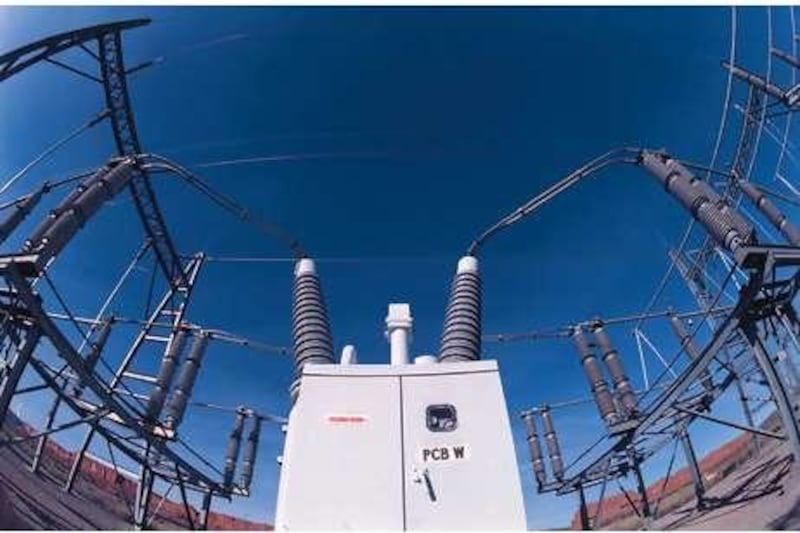The Abu Dhabi Water and Electricity Authority (Adwea) has turned to short-term financing for a multibillion dollar power project, a sign that the global credit shortage is weighing down even government-backed projects in the GCC. Adwea, which like most major power companies would prefer long-term funding, was seeking a stopgap measure for the Shuweihat S2 power and desalination plant until international credit conditions returned to normal, the director of privatisation at the utility, Abdulla Saif al Nuaimi, said yesterday. "This is a challenge for us," he told an economic development conference in Abu Dhabi. "The markets are not like before." The project, with a price tag estimated at US$2 billion (Dh7.3bn) to $3bn, will generate 1,500 megawatts (mw) of electricity and 100 million gallons of water per day, and is a major part of Adwea's efforts to keep up with the surge in demand for power. The Government wants the plant to be operational by 2011, the last year that the present generating capacity would be able to meet demand, according to Adwea's official forecast. The financing difficulties facing Adwea reflected the market as a whole, a diverse group of officials from the power industry said. New power projects in the Gulf stand "no chance" of securing funding before the end of the year, said Ranald Spiers, the executive director for the Middle East and Africa at International Power, based in the UK. "Banks at the moment are like rabbits in the headlights. If you're looking for financing in the first quarter of 2009 then you've got a sporting chance for it, but if you're looking before the end of this year, there's no chance," he said. The global financial crisis has made international and regional banks reluctant to lend, especially on the scale required for large-scale power and water projects. Analysts have expressed concerns that vital infrastructure and property developments in the country may have to be postponed or cancelled because of a lack of funding. Mr Nuaimi said Adwea was trying to finance its projects using "bridge" financing or short-term loans usually extended in exchange for equity shares. The loans will keep Adwea's operations running until the international credit market stabilises, at which point Adwea will negotiate funding at lower rates. "We believe the market will not continue to be like that... Within one to two years, we think things will be settled," he said. Adwea is moving ahead on several fronts. In July, it awarded a contract to GDF Suez, a French firm, to build and operate the Shuweihat plant. In May, the utility announced it would build a third 1500 mw plant at Shuweihat. Mr Nuaimi said yesterday that financing for the plant would not be affected. UAE companies, including several Dubai government-linked entities, have taken on large debts in recent years, drawing scrutiny from investors and ratings agencies as credit conditions have worsened. Both Dubai World and Borse Dubai, for example, must repay more than $5bn in foreign currency loans by the end of this year, according to Merrill Lynch. Yields on some of that debt have risen sharply in recent months. Yesterday, Mohamed Ali Alabbar, a member of the Executive Council and chairman of Dubai's Emaar Properties, said that Dubai's assets far outweighed its debts, leaving it in a position to service its debt for the next seven quarters. The Government was centralising its debt management system, he said. At the Abu Dhabi conference, representatives from the UAE finance industry said local banks were straining to make up for the withdrawal of foreign funding from the country. "One of the great challenges that the finance sector faces is its ability to continue to finance the growth that is anticipated" in the region, said Mukhtar Hussain, the global chief executive of HSBC Amanah. "I think there needs to be a diversification in the sources of capital, perhaps a greater localisation of capital that lies within the region." In response to the credit shortage, the Government has offered more than Dh120bn in emergency funding to banks. "The Federal Government and the Central Bank, and other government authorities including here in Abu Dhabi, are monitoring the circumstances and are committed to assuring that we have adequate funding to support the growth both of Abu Dhabi and the UAE," said Eirvin Knox, the chief executive of Abu Dhabi Commercial Bank. Fatima al Jaber, the chief operating officer of the Al Jaber Group, interpreted the Government's actions as "evidence" that it would be willing to provide support to other essential sectors, not just finance. "We think that the Government is committed to continue the support of the oil and gas business, the infrastructure business. These are really sectors that are going to go on, and development will happen," she said. * with agencies tpantin@thenational.ae cstanton@thenational.ae
Cash crunch hits Adwea
The global credit shortage is making it difficult for the Abu Dhabi Water and Electricity Company (Adwea) to finance new infrastructure.

Editor's picks
More from the national




